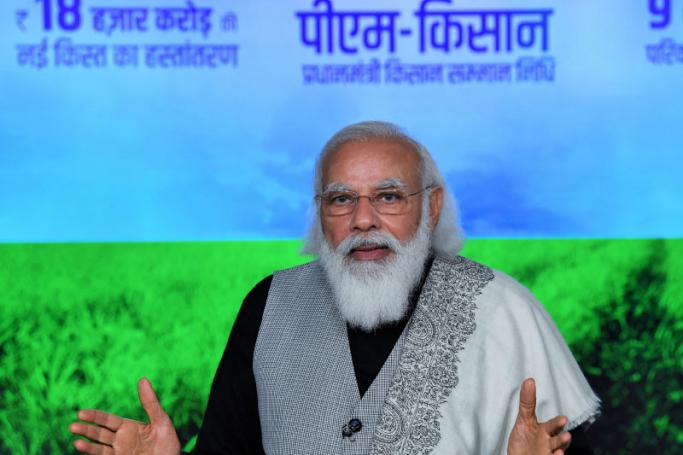A newly released book provides a fitting reminder that while the Indian government’s eyes may be focused westward in the wake of the Afghanistan debacle, Myanmar still matters if India is to make the most of what Southeast Asia offers in the years to come.
"Irrawaddy Imperatives," written by a serving army brigadier Jaideep Chanda, offers insight into an important Indian-backed project in Myanmar that it is hoped will develop into fruition, despite the setback posed by the 1 February Myanmar military coup.
India’s Act East Policy may be the flavour of the day but as author Chanda points out, India's Kaladan Multimodal Transport project, finalised in 2007, was actually conceived in 1968.
Chanda, who visited Myanmar twice as fellow of the Vivekananda International Foundation, has referred in the book to a classified Secret PM Secretariat paper dated 18 March, 1968 which was written by legendary editor B G Verghese, then handling the media section in the Indian Prime Minister’s Office (PMO).
In this five-page paper titled “Proposal for a Road–River Link from the Mizo Hills district to Akyab (now Sittwe) in Burma”, Verghese had said that “the outlet to the sea from the Mizo Hills district to Akyab (now Sittwe) through the Burmese territory could be very valuable."
Bangladesh was then East Pakistan – just prior to the 1971 conflagration - and there was no way Islamabad would grant a sea access to Northeast India through its territory, as the current-day India-friendly Sheikh Hasina government has now agreed to provide.
India reverted back to the Verghese idea in the first half of this century when an unfriendly Bangladesh government headed by then PM Begum Khaleda Zia not only turned down a gas pipeline project through Bangladesh but also refused access between Indian mainland and its northeast through Bangladesh. The basic compulsion for the Kaladan project was uncertainity over the use of Bangladesh (previously East Pakistan) for accessing the Northeast from the Indian mainland.
‘Irrawaddy Imperatives’ is a refreshingly original take on India-Myanmar relations in recent times. Without using the word doctrine, the author has, in effect, written a doctrine for India-Myanmar relations, which is best described as the Irrawaddy Doctrine. The book is timely given the present situation in Myanmar though it was completed well before the coup. It provides an exhaustive insight, from a soldier’s perspective, into Myanmar’s place in India’s security matrix, and surprisingly, despite being written by an army officer, does not confine itself to the narrow prism of security studies.
Chanda’s military and intelligence background has brought to the book both a feel of the ground and also an academic rigour evident in the original documentation that has gone into the book. The use of the personal papers of top veteran diplomats M.A Rauf, Baleswar Prasad, Y.D Gundevia and that of S.A.S Tyabji, has enriched the book.
Chanda seeks to create what he describes as "Myanmar Consciousness" in India at a time when Delhi's diplomatic focus has shifted to Afghanistan, following the disruptive Taliban victory, and it has failed to play any meaningful role in Myanmar after the February 1 coup.
The author argues that Myanmar holds the key to the success of India's Act East Policy to connect to Southeast Asia by land, much as Afghanistan is important for Delhi's attempted outreach to Central Asia from the Chabahar port in Iran, which India has financed like the renovation of the Sittwe port.
Chanda has pointed to the risks involved in Delhi getting militarily 'sucked' into the Myanmar Rakhine conflict.
"That the Arakan Army has support in Mizoram is an understatement. There seems to be institutional support as evidenced during Operation Sunrise II, the coordinated operation conducted by the Indian army in collaboration with Myanmar armed forces. Protests were lodged by the Mizoram government against the deployment of the army and the rounding up of people by the army, ostensibly for screening and briefing," Chanda says in the book.
He further adds: "The major conclusion that comes to the fore as a result of this study is that for any Indian intervention in the Rakhine conflict, the Mizoram angle has to be factored in. This is especially relevant in light of the fact certain observers have drawn comparisons with the Arakan Army and the Sri Lanka terror group, LTTE."
The warning is against Myanmar army doing a Jayawardene by dragging India into what is essentially a domestic conflict of a neighbouring nation.
‘Irrawaddy Imperatives’ reminds us of the origins of India’s eastern outreach and how important Myanmar is in the long-term in connecting with the countries of Southeast Asia.
Delhi may well have its eyes focused westward but it should also be looking east.












